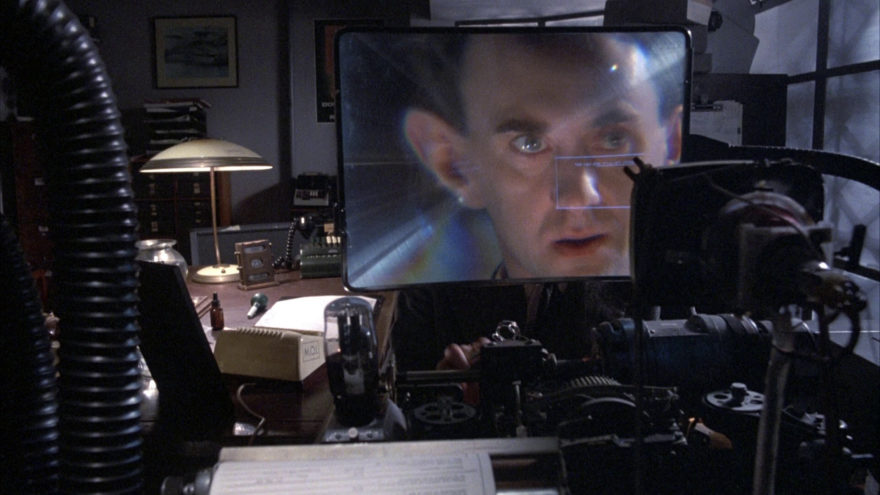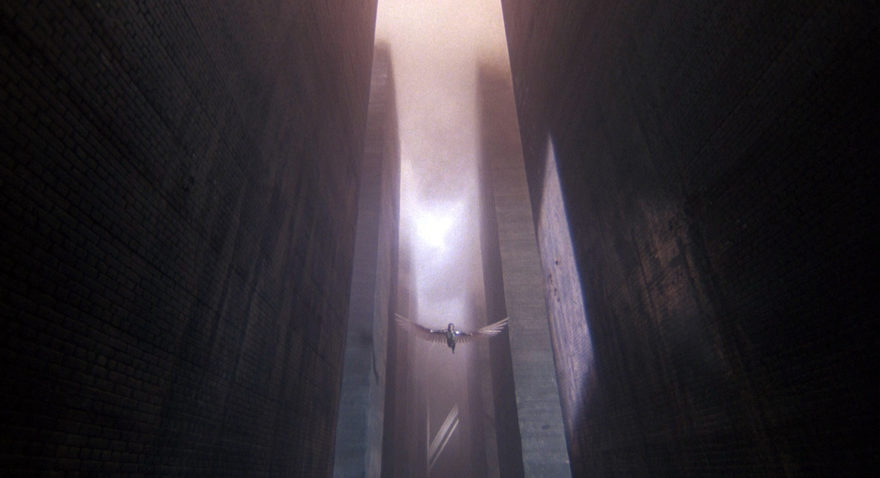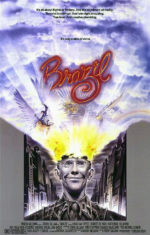A wild adventure through an absurdly authoritarian world, Brazil takes you on an outlandish trip, blending dreams and reality into awe-inspiring images and fascinating, quirky characters. It is both a portrait of a lost soul and a brutally comic takedown of all things hypocritical and bureaucratic.
Our hero dreams he is a warrior rescuing a beautiful woman. In reality he’s an awkward bureaucrat working for an oppressive government: a cog in the machine. But when he spots his dream woman in the real world he risks everything in order to find her, and leaves a wake of destruction behind him.
A comedy wrapped around a tragedy, the story begins with a bug falling into a printer and accidentally changing the name ‘Tuttle’ to ‘Buttle.’ Just before Christmas, the police raid the Buttles’ apartment, encase the father in a ridiculous canvas contraption and then whisk him away as fast as they came. Of course, he is the wrong man—but his wife and children are still left sobbing in their living room. The repercussions of this random error ripple through government agencies and right into our hero’s lap when he must deliver a refund to the family for a wrongful arrest—and then things begin to really unravel.
Brazil is probably director Terry Gilliam’s best film. Packed with amusingly human moments, it is both funny and insanely dark: an elderly woman undergoes a series of experimental plastic surgeries and shows up in a wheelchair, wrapped in oozing bandages from head to toe. She explains, “My complication had a little complication.” All this is set in a visually amazing, dystopic world where 1950s typewriters and pneumatic tubes have been transformed into modern, comically inept appliances. It is a brilliant take on a world where society seems to have made every single bad choice possible.
By no means is this a Hollywood film, and it is amazing it was ever made. With the successes of Monty Python and the Holy Grail and Time Bandits under his belt, Gilliam met independent producer Arnon Milchan, known for unique films like Birdman and The Fantastic Mr. Fox, at a restaurant in France. The two got drunk on wine and ideas and decided to work together. Milchan procured a $15 million budget and brought Robert DeNiro to the table for his inspired role as a rogue utility repairman.
When he finished the film, Gilliam’s version was 17 minutes longer than his contract specified, and this opened the door for an overzealous studio executive, Sid Sheinberg, to take control of the film. He thought he could make Gilliam’s film better by re-editing it and giving it a happy ending. Gilliam was furious and secretly showed his longer version to members of the Los Angeles Film Critics Association, who immediately awarded Brazil with Best Picture and Best Director and Best Screenplay. With this overwhelming critical acclaim the film studio had no choice but to release Gilliam’s version—a dark masterpiece of optimism and pessimism. It went on to win 10 major awards and was nominated for two Oscars as well as the Hugo Award for Science Fiction.
Although it did not perform well at the box office, Brazil was a highly influential film; Gilliam’s unique, personal vision earned the respect of countless movie buffs and film critics, with the LA Times Kenneth Turan noting that Brazil was “the most potent piece of satiric political cinema since Dr. Strangelove.” Gilliam’s own take is that the film is about being engaged in life and not being a cog in the machine, “To me, the heart of Brazil is responsibility, is involvement—you can’t just let the world go on doing what it’s doing without getting involved.”
Enjoying the site? If so consider supporting it with alien-infused caffeine…






